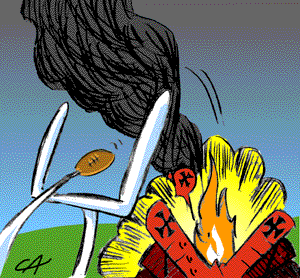NEW YORK– February 16, 2000 My discovery of the need to create stories and characters stems in very large part from that man. I have him to thank for so much more than the gumball. And I was hardly alone in my instant and undying appreciation, for dozens of others have come forth over the decades to add their ornament to the tree.
Among the thousands of homages a few stand out: The Kids in the Hall, in one of their strangest sketches, dance to the Peanuts piano theme, bending their arms and shuffling their feet in obedience to their inner Peanut. Those darn Charlie Brown zigzag T-shirts– I've wanted one since I saw it on some slacker slumping by almost a decade ago. And Tim Burton's "Nightmare Before Christmas" might never had a Pumpkin King were there not a Great Pumpkin god already lurking in his underbrain.
All these tributes and signals occured because Charles Schulz knew how to disturb without harming his readers. Trees with huge mouths, beagles over the Somme, psychiatry instead of lemonade. Trippy stuff without the tab. He could blow our minds, and never hurt us. Cartoonists of a new century cannot boast the same.
So inspired, I've plugged along as I can.
While at college, I discovered that the art department, with one notable exception, was geared to creating art wonks and gallery jousters, and that there was no place for learning cartooning, let alone graphic storytelling. Seems Chris Claremont had gotten some comic book through as a senior project and they were wary of such things ever since. Anyway, one of the non-exceptions was a fellow who plainly was disappointed in 99% of having to work at the college, instead of stay home and create his galleriosness all day, and I asked him in class whether motion and narrative had a place in still forms of pictoral art, as it once had. The professor dismissed the idea as hopelessly antique, and said flat out that it didn't interest him at all.
"Except..." he said, with a moment's odd, faraway look. "Charlie Brown." He brightened, came alive for a moment, and moved his hands one over the other, like he was happily attacking clay. "When one of them gets surprised, they flip end over end. Economy of lines. It's interesting, I like that." Then it was back to Art as usual, and he deflated again. I made another stab a few months later when some big-name artistes rolled in for their seminars. One told me I had to draw on the floor, in pitch darkness, to understand anything. They never let me get near Roy Lichtenstein.
They say write for the rich, eat with the masses. But any rich person that never read of Snoopy and Woodstock died of starvation. Perhaps like Pu Yi, the last Emperor, they never had the chance to escape the bonds of status, and so never understood that they, too, were part of mankind, a very simple construct. My father warned me once: "Why does anyone ever need to own a yacht?" A valuable lesson. Yachters are out yachting on a Sunday morning, read no funnies, and discover nothing of their fellowman.
Charles Schulz passed away as one Fortune's top 50 best-paid entertainers, and his friends say he always felt inadequate. Perhaps he never knew the great luck he enjoyed being able to work sans committee. Peanuts will always be part of our civilization, and always be Schulz. What Gene Roddenberry, and now Tolkien, wouldn't have given for such a blessing.
The Li'l Folks will continue to be merchandised, probably for the next 100 years. But Schulz' contracts are very clear: No one else may pen his strip, ever. And until that far dawn of another generation releases them into public domain, his vision will be his. It has enriched our people fifty-thousand-fold more than any stolen notion out of Disney, or ugly tireyard like South Park.
Of course, they are all free now, really. All his characters, met with sudden retirement, must have come to him, all at once, wondering just what to do next. One can see them there, making declarations with upraised arms, wondering at possibilities, at his side.
Perhaps they had an idea for new strip. But my guess is, they carried the hero home on their shoulders. I can't imagine it happening any other way.
–Chris Adams
 "I have big plans for my work..."
"I have big plans for my work..."
–Rerun
in a flashback panel
from the final Peanuts
writing from Harrisburg, Feb 14 - 16, 2000.
 Radio Free Wyhtl 2.2
Radio Free Wyhtl 2.2